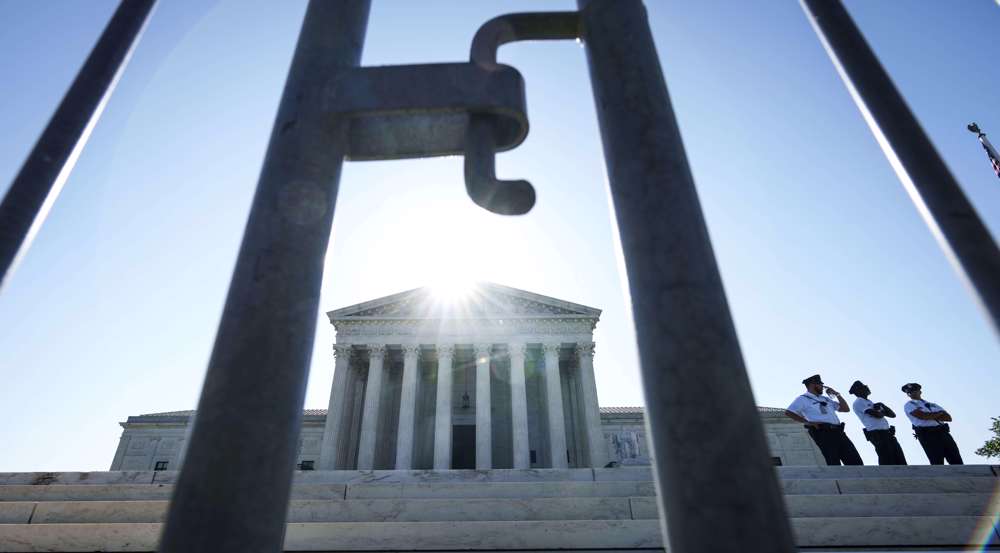US Supreme Court backs pipeline companies in land grab
An unprecedented ruling by the US Supreme Court has backed pipeline companies in a New Jersey land dispute.
The 9-member US Supreme Court on Tuesday ruled 5 to 4 in favor of the PennEast Pipeline Company -- a consortium of energy companies, including Enbridge, South Jersey Industries, New Jersey Resources Corp (NJR), Southern Co and UGI Corp -- to seize the land owned by the state of New Jersey.
The court ruled that the Natural Gas Act (1938) grants permission to private energy companies to seize “necessary” lands for a project if they have obtained a certificate from the Federal Energy Regulatory Commission (FERC).
“Specifically, we are asked to decide whether the federal government can constitutionally confer on pipeline companies the authority to condemn necessary rights-of-way in which a state has an interest. We hold that it can,” Chief Justice of the United States, John Roberts, wrote for the court.
Justice Amy Coney Barrett, one of the Supreme Court judges writing on behalf of the justices who opposed to the ruling, however, argued that permitting the seizure of a state’s land by a private company violated court precedent.
She wrote that the US Constitution does not allow for Congress to interfere with states' sovereign immunity.
“Congress cannot circumvent state sovereign immunity’s limitations on the judicial power through its Article I powers,” Barrett wrote. “Thus, even in areas where Article I grants it ‘complete lawmaking authority,’ Congress lacks a tool that it could otherwise use to implement its power: ‘authorization of suits by private parties against unconsenting States.’”
New Jersey had not consented to PennEast’s take over of properties that the state owned or in which it had an interest.
PennEast's lawyers claimed that the 187km mega-project, stretching from Pennsylvania to New Jersey, would be "at the mercy of New Jersey" if the pipeline loses the case because there was no way to re-route it without the state's involvement.
After a federal judge approved the New Jersey property seizure by PennEast, the Philadelphia-based 3rd US Circuit Court of Appeals ruled in 2019 that the consortium could not use federal eminent domain to condemn land controlled by the state, sending the appeal to the Supreme Court for a final ruling on the dispute.
US House of Representatives Energy and Commerce Committee Chairman Frank Pallone said the unprecedented Supreme Court ruling had set a dangerous example for future land grabs by private sector actors aiming to seize properties owned or controlled by the states. “States like New Jersey should be able to retain their right to do what they wish with the lands they own, and no private actor - including pipeline companies - should be able to usurp that right.”
New Jersey Attorney General Gurbir Grewal said the new ruling by the Supreme Court of the United States (SCOTUS) does not bring an end to the fight against the PennEast project.
We're disappointed by today’s SCOTUS ruling on the PennEast pipeline, but our fight is far from over. I'm proud to continue standing up for our residents & championing environmental protection. I urge the feds to take another look at this harmful proposal. https://t.co/vcrPYR4doQ
— AG Gurbir Grewal (@NewJerseyOAG) June 29, 2021
The SCOTUS ruling “is not the end of the road in our fight against the PennEast pipeline,” Grewal pointed out.
“We still have other, ongoing legal challenges to this proposed pipeline, which is unnecessary and would be destructive to New Jersey lands” Grewal wrote in an emailed statement.
US President Joe Biden's administration had backed PennEast in the case against New Jersey.
Chinese, South African naval commanders visit Iranian task group in Cape Town
Iran condemns G7 hypocrisy on human rights following interventionist statement
VIDEO | US, Israel role in terror attacks in Iran
VIDEO | Death behind bars: Gaza’s prisoners. silence surrounding them
60,000 weapons bound for Tehran seized as Mossad-trained terror cell busted
VIDEO | 13th day of war
Israeli strikes kill two in Lebanon as UNIFIL warns against ceasefire violations
Trump threatens to slap tariffs on countries opposed to US Greenland takeover













 This makes it easy to access the Press TV website
This makes it easy to access the Press TV website